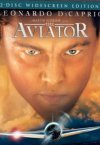BUY THE DVD:
|


|
|
|
SYNOPSIS:
| |
a biopic depicting the early years of legendary director and aviator howard hughes' career, from the late 1920's to the mid-1940's.
|
|
|
MOVIE FACT:
| |
this is the first feature film that star leonardo dicaprio's production company "appian way" is involved with.
|
|
|
RATING:
|




four out of four possible stars
|
|
|
|
In The Aviator, star Leonardo Dicaprio delves deeper into the psyche of his character than he has for any performance previous. Not since his breakthrough performance in What's Eating Gilbert Grape has DiCaprio fallen in so believably into his role. Beyond his uncanny resemblence to the reclusive Howard Hughes, DiCaprio's emotional output in the role is emotionally stunning. His performance eclipses all others in the film, despite his co-stars' not insubstantial contributions to their characters.
Over the film's impressive 166 minute running time, director Martin Scorcese and his crew accomplish the impossible and actually increase the momentum all the way to the closing credits. Scorcese is infamous for creating multi-hour epics that stretch the viewer's willingness to sit in one place for more than the standard 120 minutes that dramatic films tend to be. But more often then not, the subjects he chooses are shown to their dramatic best with his intelligent casting choices and signature style of including heavy orchestral masterpieces on the soundtrack.
It could be argued that the editor might have employed his talents more efficiently in the late-middle portion of the film, but by the closing of the film, the intensity of the narrative literally roars, making the running time seem all together too short. This impressive display is due heavily to DiCaprio's involvement in the film, but is also helped by the fine filmmaking concerning all aspects fo the production. From the aforementioned musical soundtrack to the cinematography, this film is a heady experience on the big screen.
In terms of the special effects excellence of the film, the crash sequence near the middle of the story (where Hughes crashes into the middle of a Los Angeles neighborhood) is one of the best such sequences ever put together. Tightly wound and edited at a fever pitch, when Hughes's plane actually hits the ground, it practically knocks the wind out of the viewer. This sequence alone is deserving of an accolate for professional merit. And further into the look of the film, replicating to an expert degree the world of 1930's and 40's Hollywood, the film is beautiful and intricate regarding both its costuming and production design.
The cinematography highlights well the work of the visual designers while still allowing the performers to take center stage in the narrative. And given the level of talent available to viewers in virtually every role of the film, there's never an opportunity for disinterest or boredom to grow. In addition to DiCaprio's commanding performance, Kate Beckinsale (playing Ava Gardener) and Cate Blanchett (playing Katherine Hepburn) don't necessarily resemble the real-life actors they portray, but each seems to embody her spirit. The most notable aspect of their performances is probably Blanchett's adoption of Hepburn's trademark accent and cadence of speech.
The accent itself was entirely a fabrication of Hepburn during her early years in film and Blanchett handles the transformation with ease. She even goes so far as to allow the accent to fade out just a bit when Hughes interrogates her about her need to put on a "show" even when she's not in front of the camera. Likewise, Kate Beckinsale pulls on the demanding persona of Ava Gardener with something more akin to confidence rather than simply a physical tranformation.
Other fine supporting performances come from across the board, including Alec Baldwin in the role of a rival aviation executive and John C. Reilly in the role of Hughes's financial advisor. Each manages to round out the plump story and beyond the engrossing individual performances, allow the entire cast to create a remarkable overall chemistry with one another. Without these specific actors in each specific role, the film might not have come together so neatly. In particular, Blanchett and DiCaprio, playing Hepburn and Hughes as free-spirited young lovers, have an intense and believable bond with one another whenever they're on screen together. John C. Reilly also shares a natural friendship with DiCaprio's performance as Hughes.
As an expert on creating an affecting montage sequence which usually packs a fair bit of humor into it, director Scorcese seems to have honed this tradmark into a precise art. These types of sequences, which occur in all his films and which usually come around when a character is undergoing some sort of intense emotional change (usually of a deadly nature), also sport rather expansive pieces of familiar orchestral music. For Hughes' desperate attempt to fly his giantic multi-million dollar creation, "The Spruce Goose," viewers will hear an especially full-bodied rendition of "Tocatta and Fugue in D Minor," by J.S. Bach. You could probably put dancing hotdogs on the screen with this type of score and end up with a masterpiece, but Scorcese does it much, much better. Simply riveting.
As a man whose eccentricities and neuroses extended far beyond the normal human predeliction toward such behavior, the story of Howard Hughes is a fascinating one. An aviation genius and a man who changed not just the face of the airline industry, but who challenged everything about aviation itself, his story is brought to exciting fruition through Martin Scorcese's hands. Pulling a most intelligent set of performances from his well-chosen cast, his crew joins him in creating a show-stopping visual and audial feast. A film that only improves as each reel rolls on, The Aviator is a movie that more that simply succeeds on multiple creative levels. It is also an emotionally gripping biography and a beautiful film in both technical achievement and performance.
Review by Kelsey Wyatt.
| |
|